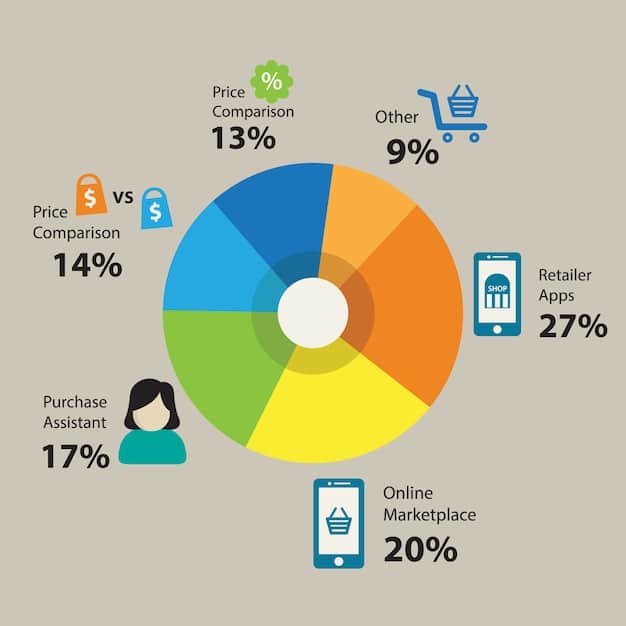Understanding Updated FTC Data Privacy Regulations for Businesses

Understanding the implications of the updated FTC regulations on data privacy for businesses involves adapting to new rules regarding data security, transparency, and consumer rights, crucial for maintaining compliance and consumer trust.
Navigating the complex landscape of data privacy can be challenging, especially with the ever-evolving regulations set forth by the Federal Trade Commission (FTC). Understanding the implications of the updated FTC regulations on data privacy for businesses is crucial for compliance and maintaining consumer trust, which requires proactive measures and a comprehensive approach.
What are the FTC’s Updated Data Privacy Regulations?
The FTC’s updated data privacy regulations represent a significant shift in how businesses must handle consumer data. These changes aim to enhance transparency, strengthen data security, and empower consumers with greater control over their personal information.
Key Changes in the Updated Regulations
Several key changes have been introduced in the updated regulations, compelling businesses to re-evaluate their data privacy practices. These changes cover various aspects of data handling, including collection, storage, usage, and sharing.
Transparency Requirements
Transparency is at the forefront of the updated regulations. Businesses are now required to provide clear and concise disclosures about their data collection and usage practices. This includes informing consumers about the types of data collected, how it is used, and with whom it is shared.
- Provide clear and easily accessible privacy policies.
- Obtain explicit consent for data collection and usage.
- Communicate data breaches promptly and transparently.

Enhanced Data Security
The updated regulations also place a strong emphasis on enhanced data security. Businesses must implement reasonable security measures to protect consumer data from unauthorized access, theft, or misuse. This includes conducting regular security assessments, implementing encryption protocols, and training employees on data security best practices.
The updated FTC regulations on data privacy call for a proactive and comprehensive approach to data handling. By understanding and implementing these changes, businesses can not only ensure compliance but also build stronger, more trusting relationships with their customers.
Why are these Regulations Important for Businesses?
These regulations are essential for businesses because they foster a culture of trust and accountability. Compliance with these rules not only helps in avoiding legal repercussions but also enhances the company’s reputation and customer loyalty.
Protecting Consumer Rights
A primary objective of these regulations is to protect consumer rights. By ensuring that businesses handle data responsibly and transparently, consumers are empowered to make informed decisions about their personal information.
Avoiding Legal Penalties
Non-compliance with the FTC’s data privacy regulations can result in significant legal penalties, including fines, lawsuits, and other enforcement actions. Staying compliant is crucial for avoiding these costly consequences.
Building Customer Trust
In today’s digital age, consumers are increasingly concerned about their data privacy. Businesses that prioritize data protection and transparency are more likely to build strong, long-lasting relationships with their customers.
- Demonstrate a commitment to data security.
- Communicate transparently about data practices.
- Respect consumer choices regarding data usage.
Adhering to the new FTC regulations demonstrates that your business values consumer privacy and is committed to ethical data handling, which in turn cultivates stronger customer relationships and a positive brand image.
How do these Regulations Impact Different Industries?
The impact of these regulations varies across different industries, depending on the nature of their data collection and usage practices. Each industry must adapt its approach to data privacy to align with the new FTC guidelines.
Healthcare Industry
The healthcare industry handles sensitive patient data, making it a prime target for data breaches. The updated regulations require healthcare providers to implement stringent security measures to protect patient privacy and comply with HIPAA regulations.
Financial Services Industry
Financial institutions collect and process vast amounts of financial data, making them subject to strict data privacy requirements. They must ensure that customer data is protected from fraud, identity theft, and other security threats.
Retail Industry
Retailers collect customer data for marketing, advertising, and personalization purposes. The updated regulations require retailers to obtain explicit consent for data collection and provide consumers with the ability to opt-out of data sharing.

Each industry must assess its specific data handling practices and implement tailored strategies to ensure compliance with the updated FTC regulations. This may involve updating privacy policies, enhancing security measures, and training employees on data privacy best practices.
What Steps Can Businesses Take to Ensure Compliance?
To ensure compliance with the updated FTC regulations, businesses should take a proactive and comprehensive approach to data privacy. This involves implementing necessary security measures, conducting regular audits, and updating privacy policies.
Conduct a Data Privacy Audit
The first step towards compliance is to conduct a thorough data privacy audit. This involves assessing the types of data collected, how it is used, and with whom it is shared. The audit should identify any gaps or weaknesses in the existing data privacy practices.
Implement Robust Security Measures
Businesses must implement robust security measures to protect consumer data from unauthorized access, theft, or misuse. This includes using encryption protocols, implementing access controls, and conducting regular security assessments.
Update Privacy Policies
Privacy policies should be updated to reflect the changes in the updated FTC regulations. These policies should be clear, concise, and easily accessible to consumers. They should also provide information about the types of data collected, how it is used, and with whom it is shared.
- Designate a privacy officer.
- Provide regular training to employees.
- Establish a data breach response plan.
Taking these steps will help businesses align their data privacy practices with the FTC’s updated regulations, minimizing the risk of legal penalties and enhancing customer trust.
The Role of Technology in Data Privacy Compliance
Technology plays a crucial role in data privacy compliance, offering tools and solutions to streamline data protection efforts. Embracing these technological advancements can significantly enhance a business’s ability to adhere to the FTC’s updated regulations.
Data Encryption
Data encryption is a fundamental technology for protecting sensitive information. By encrypting data both in transit and at rest, businesses can prevent unauthorized access and ensure the confidentiality of consumer data.
Access Controls
Implementing strict access controls is essential for limiting access to sensitive data. This involves granting access only to authorized personnel and monitoring user activity to detect and prevent security breaches.
Privacy-Enhancing Technologies
Privacy-enhancing technologies (PETs) offer innovative solutions for protecting data privacy while enabling data analytics and processing. These technologies include anonymization, pseudonymization, and differential privacy.
By leveraging these technologies, businesses can enhance their data privacy compliance and build stronger, more resilient data protection practices. This not only helps in meeting regulatory requirements but also demonstrates a commitment to safeguarding consumer data in an increasingly complex digital environment.
Future Trends in Data Privacy Regulationsand data usage
Data privacy regulations are continuously evolving to keep pace with technological advancements and changing consumer expectations. Staying informed about future trends in data privacy is crucial for businesses to proactively adapt their data handling practices.
Increased Focus on Consumer Empowerment
Future regulations are likely to place an even greater emphasis on consumer empowerment, giving individuals more control over their personal data. This may include the right to access, correct, and delete their data, as well as the right to data portability.
AI and Data Privacy
As artificial intelligence (AI) becomes more prevalent, regulations will need to address the data privacy implications of AI-driven data processing. This may involve regulating the use of AI in data analytics, ensuring transparency in AI algorithms, and protecting against bias in AI-driven decision-making.
Global Data Privacy Standards
There is a growing trend towards the harmonization of data privacy standards across different jurisdictions. Businesses that operate globally will need to comply with a variety of data privacy laws, making it essential to adopt a consistent and comprehensive approach to data protection.
Looking ahead, businesses need to anticipate and prepare for these future trends in data privacy regulations. By staying informed, adapting their practices, and investing in privacy-enhancing technologies, they can maintain compliance, build trust with their customers, and thrive in an increasingly data-driven world.
| Key Point | Brief Description |
|---|---|
| 🛡️ Data Security | Implementing robust security measures to protect consumer data. |
| 📜 Transparency | Providing clear and accessible privacy policies to consumers. |
| ✅ Compliance | Adhering to FTC regulations to avoid penalties and build trust. |
| 💡 Technology | Leveraging technology for data encryption and access controls. |
FAQ Section
▼
The main goals include enhancing transparency, strengthening data security, and empowering consumers with greater control over their personal information. These regulations aim to ensure businesses handle data responsibly.
▼
Businesses can conduct data privacy audits, implement robust security measures, update their privacy policies, and provide regular training to employees. Designating a privacy officer can also help in maintaining compliance.
▼
Technology plays a crucial role by providing tools like data encryption, access controls, and privacy-enhancing technologies that streamline data protection efforts and enhance a business’s ability to comply with regulations.
▼
Non-compliance can result in significant legal penalties, including fines, lawsuits, and other enforcement actions. Staying compliant is essential for avoiding these costly consequences and maintaining customer trust.
▼
The impact varies across industries. Healthcare providers must protect patient data, financial institutions must secure financial information, and retailers must obtain consent for data collection, each adapting to their specific data handling practices.
Conclusion
In conclusion, understanding the implications of the updated FTC regulations on data privacy for businesses is essential for compliance, building customer trust, and avoiding legal penalties. By implementing robust security measures, providing transparent privacy policies, and staying informed about future trends, businesses can navigate the complex landscape of data privacy and thrive in an increasingly data-driven world.





